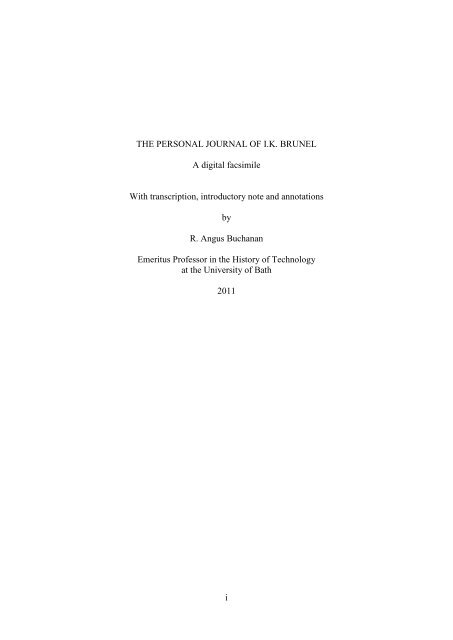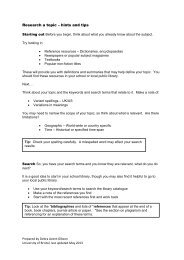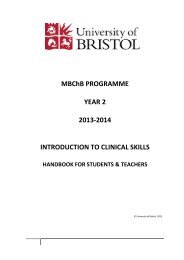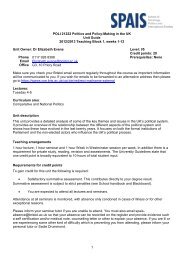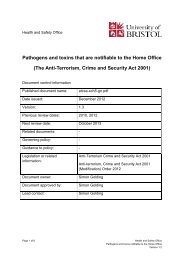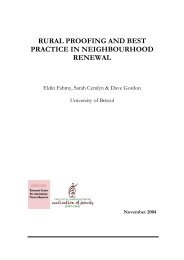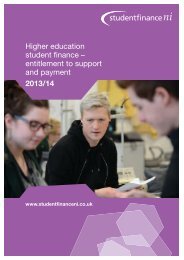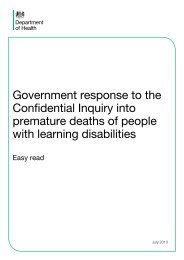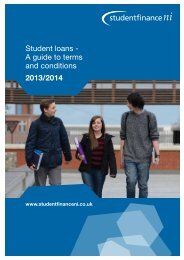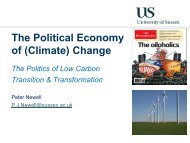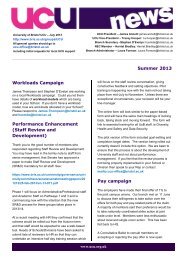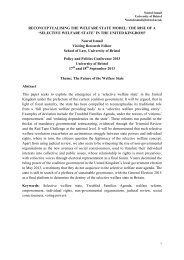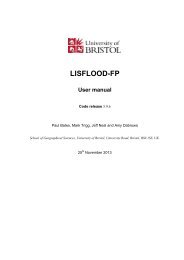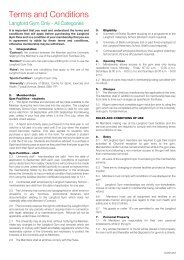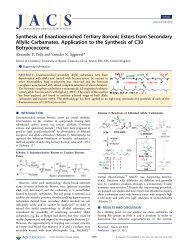Create successful ePaper yourself
Turn your PDF publications into a flip-book with our unique Google optimized e-Paper software.
THE PERSONAL JOURNAL OF I.K. BRUNEL<br />
A digital facsimile<br />
With transcription, introductory note and annotations<br />
by<br />
R. Angus Buchanan<br />
Emeritus Pr<strong>of</strong>essor in the History <strong>of</strong> Technology<br />
at the <strong>University</strong> <strong>of</strong> Bath<br />
2011<br />
i
THE PERSONAL JOURNAL OF I.K. BRUNEL<br />
[<strong>University</strong> <strong>of</strong> <strong>Bristol</strong> Library, Special Collections, DM 1306/II.1. Page numbers <strong>of</strong><br />
the manuscript and editorial additions are given in square brackets]<br />
ii
THE PERSONAL JOURNAL OF I.K. BRUNEL<br />
Brunel began writing this Personal Journal in October 1827. He was twenty-one, and<br />
was already working as assistant engineer to his father on the Thames Tunnel, based<br />
at the head <strong>of</strong> the shaft in Rotherhithe from which the tunnelling shield patented by<br />
Marc Brunel was burrowing its way northwards under the river. The young Brunel<br />
had been trained by his father to keep a fairly formal <strong>diary</strong>, which he managed to do<br />
episodically during the years in which he was working on the Tunnel. But he felt the<br />
need also for some more personal form <strong>of</strong> self-expression by which he could record<br />
his most intimate thoughts and feelings. So he acquired a small leather-bound<br />
notebook sealed with a clasp and key, and began to confide to it a series <strong>of</strong> reflections<br />
intended for no eyes except his own. Writing in ink, on one side <strong>of</strong> each page only, he<br />
filled 35 pages and then, on 6 th April 1829, he stopped.<br />
At this point he appears to have had some sort <strong>of</strong> apprehension <strong>of</strong> early death, and<br />
lightened his gloom by penning a dedicatory letter to his friend Benjamin Hawes,<br />
leaving the Journal to his friend in the event <strong>of</strong> his death. He added a ‗codicil‘ to this<br />
letter three years later, while he was assisting Hawes in the parliamentary election<br />
campaign <strong>of</strong> 1832. But so far as we know, Hawes never received this legacy, because<br />
the document survived with other papers in the family, to be deposited eventually in<br />
what is now the Special Collection <strong>of</strong> Brunel material in the <strong>University</strong> <strong>of</strong> <strong>Bristol</strong><br />
Library. It has been used by biographers <strong>of</strong> Brunel, who have found it to be a<br />
revealing and sometimes puzzling source <strong>of</strong> information about the mind <strong>of</strong> their<br />
subject. Until now, however, it has not been available in a form in which it is both<br />
easy to read and possible to understand most, if not quite all, <strong>of</strong> the sentiments<br />
expressed therein.<br />
The entries in the Journal occur in four episodes, <strong>of</strong> unequal length and<br />
significance. The First covers the period from October to December 1827 [1-14] with<br />
entries on 11 October, 13 October, 4 November, 5 November, 21 November and 29<br />
December. The mood at this time was up-beat and dominated by the work for which<br />
Brunel was responsible on the Thames Tunnel, but it was lightened by fanciful<br />
depictions <strong>of</strong> prospects - his ‗castles in the air‘ - including his relations with the Fair<br />
Sex. The Second episode is in more sombre mood, covering the period from April to<br />
August 1828 [15-34] with entries on 22 April, 6-7 May, 8 June, 13 June, and 17<br />
August. The first <strong>of</strong> these, on 22 April, is a long reflection on the dramatic incidents<br />
<strong>of</strong> 12 January, when he almost lost his life in an inundation <strong>of</strong> the Tunnel. At the time<br />
<strong>of</strong> writing he was still recuperating in bed from the after-effects <strong>of</strong> this accident, and<br />
he remained in bed for the next entry on 6-7 May. He took the opportunity to outline<br />
what was in effect a rule <strong>of</strong> life, stipulating a desirable allocation <strong>of</strong> his time. In the<br />
entries for 8 and 13 June he was concerned mainly with his matrimonial prospects,<br />
but on 17 August he returned to the deplorable state <strong>of</strong> affairs in the Tunnel business,<br />
which had virtually come to a standstill. The Third episode was an entry on 6 April<br />
1829 [35], in which he briefly noted the lack <strong>of</strong> progress in both his business and<br />
personal interests. Finally, the Fourth episode was marked two days later, on 8 April<br />
1829, the eve <strong>of</strong> Brunel's twenty-third birthday, by the addition <strong>of</strong> the letter scribbled<br />
in the opening flyleaves <strong>of</strong> the notebook to Benjamin Hawes. [i-iv] This was<br />
completed by the ‗codicil‘ <strong>of</strong> 2 August 1832, after which there is no record <strong>of</strong> Brunel<br />
ever having looked at the notebook again. It can be surmised that he made subsequent<br />
efforts to keep a personal record <strong>of</strong> this type, but if he was successful in doing so there<br />
is no record <strong>of</strong> anything having survived. The period from 1832 to his death in 1859<br />
iii
was, moreover, one <strong>of</strong> virtually continuous pressure from enormous preoccupations <strong>of</strong><br />
business, so it was not conducive to the sort <strong>of</strong> reflectiveness that is essential for<br />
sustained journal writing.<br />
Even though the Personal Journal covers such a small fragment <strong>of</strong> the early career<br />
<strong>of</strong> I.K. Brunel, it contains some wonderful insights into the mind <strong>of</strong> its author, both as<br />
a pr<strong>of</strong>essional man and as a human being. We are not dealing with juvenilia here:<br />
despite his youth, Brunel had already travelled extensively and was currently carrying<br />
tremendous pr<strong>of</strong>essional responsibilities in place <strong>of</strong> his ageing father. His reflections,<br />
even when they are occasionally immature and fanciful, are informed by a powerful<br />
creative imagination and a disciplined dedication to his chosen career. His<br />
pr<strong>of</strong>essional commitment, indeed, is remarkable in such a young man, and testifies to<br />
the diligence with which Marc Brunel had attended to his son‘s training. The young<br />
engineer was already so committed to his career that he was prepared to conclude that<br />
‗my pr<strong>of</strong>ession is after all my only fit wife‘. [28] The enthusiasm with which he<br />
equipped himself with the best tools [13-14], collected useful information [21], and<br />
ranged over possible engineering projects [24, 30, etc] are all indicative <strong>of</strong> singleminded<br />
devotion to the pr<strong>of</strong>ession. There is no talk yet <strong>of</strong> railways, or even <strong>of</strong><br />
building ships, but he thinks <strong>of</strong> bridges [24] and lighthouses [30], where other<br />
engineers were already making great reputations for themselves, and allows his mind<br />
to conjure up all sorts <strong>of</strong> grandiose imperial projects – ‗in fact take Algiers or<br />
something in that style‘ [4] - in which he could use his engineering expertise.<br />
Considering the still largely inchoate nature <strong>of</strong> the engineering pr<strong>of</strong>ession in Britain at<br />
this time, it is quite astonishing to find so clear a resolve in the mind and aspirations<br />
<strong>of</strong> such a young recruit.<br />
As far as his personal life was concerned, the Personal Journal is illuminating<br />
about Brunel. For one thing, it shows his strangely obsessive secrecy. [i] One expects<br />
a <strong>diary</strong> to be a personal document and not open to the eyes <strong>of</strong> everybody, but the<br />
anxiety with which the young Brunel preserved the privacy <strong>of</strong> this particular<br />
document is curious. Then there is the charming candour with which he catches his<br />
own pride and vanity, as when he finds himself ‗trying to look big on my little pony‘<br />
[3] and regretting his lack <strong>of</strong> a horse [18]; and deploring his inability to purchase<br />
tools, so that he acknowledges the need to ‗attendons un peu‘. [14] Most dramatically,<br />
perhaps, we have Brunel's musings on possible marriage partners, from which it is<br />
clear that his thoughts ranged widely. The names <strong>of</strong> several young ladies, hidden<br />
behind initials, have not yet been identified, but one <strong>of</strong> them, Ellen Hulme, emerges as<br />
his first love – ‗the oldest and most constant‘[11] – whose affections had reigned for<br />
‗nearly seven years‘, which takes them back to 1820, when Brunel would have been<br />
fourteen.<br />
Ellen came from a Manchester family, so that it seems likely that the young Brunel<br />
would have met her in the course <strong>of</strong> a visit or other business <strong>of</strong> his father, but it has<br />
not been possible to establish any details with certainty. What we do know is that<br />
Brunel broke <strong>of</strong>f any tentative ‗engagement‘ in 1829 – ‗I have had long<br />
correspondence with Ellen which I think I have managed well‘. [35] But she had<br />
shown herself a lively young lady, capable <strong>of</strong> quizzing Brunel – ‗A shocking habit<br />
that <strong>of</strong> quizzing it at last prevents a person from thinking seriously‘ [32] - and we<br />
know that Brunel retained a s<strong>of</strong>t spot in his affections for her because he went to some<br />
trouble to arrange an annuity for her in the last year <strong>of</strong> his life. 1 The real sticking point<br />
for him, however, had been that he could not afford to marry in 1827-28, and he did<br />
1 See Angus Buchanan, Brunel: The Life and Times <strong>of</strong> Isambard Kingdom Brunel (2002), p. 193.<br />
iv
not actually undertake such a commitment until eight years later, by which time he<br />
was well established and on the way to making a fortune.<br />
Finally, the Journal demonstrates a close bond between Brunel and his brother-inlaw,<br />
Benjamin Hawes, although it is not possible to determine the extent to which the<br />
surprisingly warm feelings expressed by Brunel in his dedicatory letter were<br />
reciprocated. [i-iv] We know that Brunel was close to his elder sister, Sophia, who<br />
had married Hawes in 1820 and that he spent a considerable amount <strong>of</strong> time at the<br />
Hawes‘ home, Barge House in Lambeth. [15] He also turned out to support Hawes in<br />
be successful election campaign he ran in 1832 for the new parliamentary<br />
constituency <strong>of</strong> Lambeth [iv] and the families <strong>of</strong> the two men remained on friendly<br />
terms for the rest <strong>of</strong> their lives. But the strength <strong>of</strong> the feelings expressed by Brunel in<br />
his dedicatory letter, where he expresses passions which are ‗staunch and true and<br />
unchangeable‘ [ii] is puzzling. So is the confession <strong>of</strong> faults – ‗what is worse they<br />
decidedly increase‘ [iv] - and the expression <strong>of</strong> misery – ‗I‘m unhappy - exceedingly<br />
so‘ [iv] - with its suggestion that Brunel did suffer from moods <strong>of</strong> deep introspection<br />
and near despair, which he describes as feeling ‗blue‘. Possibly, like Winston<br />
Churchill and his ‗black dog‘ moods, Brunel was prone to these moments <strong>of</strong><br />
dejection. Happily for his reputation, however, he seems to have left them behind<br />
once the pressure <strong>of</strong> work from his colossal pr<strong>of</strong>essional commitments took his mind<br />
<strong>of</strong>f such personal considerations.<br />
The text <strong>of</strong> the Personal Journal is not easily read in its original form. Even<br />
familiarity with the flowing handwriting <strong>of</strong> Brunel does not mean that every word is<br />
immediately decipherable, and there are a few phrases that do not submit even to<br />
prolonged investigation. The substance, moreover, gives the impression <strong>of</strong> having<br />
been written in a sort <strong>of</strong> stream <strong>of</strong> consciousness, as the author relaxed from his<br />
pr<strong>of</strong>essional commitments and allowed his thoughts and reflections to pour out onto<br />
the page without much regard to the disciplines <strong>of</strong> punctuation, syntax, and spelling.<br />
Idiosyncrasies <strong>of</strong> spelling such as Brunel‘s habit <strong>of</strong> writing ‗always‘ with double ‗l‘<br />
have been preserved in this version, but some attempt has been made to tidy up the<br />
punctuation in order to make clear the author's intended meaning. The addition <strong>of</strong><br />
footnotes provides explanations where necessary <strong>of</strong> the subject discussed by the<br />
author, but these are not intended to be intrusive. The page format <strong>of</strong> the Journal has<br />
been preserved with the page number being given in square brackets. It is hoped that,<br />
by presenting the text in a tidy and annotated form, the quality <strong>of</strong> Brunel‘s insights<br />
into his own activities and motivations can be most clearly revealed.<br />
RAB<br />
June 2006<br />
v
ACKNOWLEDGEMENTS<br />
The Personal Journal <strong>of</strong> I.K. Brunel is part <strong>of</strong> the <strong>University</strong> <strong>of</strong> <strong>Bristol</strong> Brunel<br />
Collection a rich archive held at the Brunel Institute, a collaboration <strong>of</strong> the ss Great<br />
Britain Trust and the <strong>University</strong> <strong>of</strong> <strong>Bristol</strong>. I would like to record my gratitude to the<br />
<strong>University</strong> Librarians and Archivists who, over many years, have generously made<br />
this Collection available to me. In particular, the present Archivist, Michael<br />
Richardson, has given me substantial help in wrestling with the difficulties <strong>of</strong><br />
Brunel‘s handwriting. He has also suggested several valuable improvements in the<br />
transcription, and has made a satisfactory interpretation <strong>of</strong> the few words <strong>of</strong><br />
experimental shorthand included in the text. I thank him warmly for his assistance. In<br />
the last resort, however, I take full responsibility myself for the form <strong>of</strong> the document<br />
presented here.<br />
BIBLIOGRAPHIC NOTE<br />
While it is arguable that the Personal Journal is the single most illuminating<br />
document in the Brunel Collection, it is only a fragment <strong>of</strong> a large archive which<br />
includes Diaries, Letter Books, Sketchbooks and many other papers. A brief guide to<br />
this Collection and a rapidly augmenting online catalogue are available from the<br />
<strong>University</strong> <strong>of</strong> <strong>Bristol</strong> Library website and a precis <strong>of</strong> the Letter Books can also be<br />
consulted in the Special Collections Room and at the Brunel Institute. The main items<br />
are listed in the Bibliography <strong>of</strong> my recent book: see Angus Buchanan, Brunel: The<br />
Life and Times <strong>of</strong> Isambard Kingdom Brunel (Hambledon & London, 2002), pp. 271-<br />
280. This Bibliography also contains a list <strong>of</strong> the most important printed works on<br />
Brunel. But worthy <strong>of</strong> special mention, in relation to the Personal Journal, is<br />
Isambard Brunel‘s biography <strong>of</strong> his father, The Life <strong>of</strong> Isambard Kingdom Brunel,<br />
Civil Engineer (first published 1870; reissued, David & Charles, Newton Abbot,<br />
1970); and Celia Brunel Noble‘s study <strong>of</strong> her grandfather and great-grandfather, The<br />
Brunels, Father and Son (1938). Also well worth consulting is L.T.C. Rolt, Isambard<br />
Kingdom Brunel (Longmans, London, 1957; Penguin editions 1970 and 1989). There<br />
are two works on Marc Brunel which are relevant to the Personal Journal: Richard<br />
Beamish, Memoir <strong>of</strong> the Life <strong>of</strong> Sir Marc Isambard Brunel (1862), and Paul Clements,<br />
Marc Isambard Brunel (1970).<br />
vi
[1] October [11 October 1827, inferred from following paragraphs]<br />
At last I have begun this my private journal even now altho‘ at the<br />
second line I can hardly perswade myself that it is real1y private but am<br />
puzzling myself for proper words thus destroying the very object I have<br />
in view viz to record my feeling habits faults wishes hopes and every<br />
thing belonging to the present moment. The pleasure I shall derive<br />
hereafter in reading and comparing the remarks made at different time<br />
will I promise myself be very great. I think also with good will much<br />
utility and some good lessons may be got. To begin.<br />
My present intentions are to put down whatever is upermost in my<br />
mind without order or arrangement.<br />
I have had this book 8 or 10 weeks: have had many better<br />
opportunities, why have I not begun before? I have postponed it! I am<br />
very prone to say tomorrow,<br />
1
[2] and yet I am not irresolute nor do I want firmness in greater matters. I<br />
must cure myself <strong>of</strong> this - tomorrow I will begin --------<br />
This is Saturday night 12 1/2 o‘clock. A few hands at work below.<br />
Williams just gone home. Sitting by my fire writing this - it‘s a great<br />
Luxury is being alone - and comfortable. My life has been as yet pretty<br />
full <strong>of</strong> varieties: what shall I be hereafter? At present thinking <strong>of</strong> nothing<br />
but the tunnel: living here entirely at Rotherhithe 1 I get up every morning<br />
at 8 a.m., see the various things concerning the works all the morning.<br />
We dine at 3 p.m., one week boarding with me then a week at Gravatts 2<br />
and so on. After diner [sic] I come on duty more particularly taking<br />
charge <strong>of</strong> the works below till 2 in the morning when Gravatts [sic] gets<br />
up and we sup together. I then go to bed on the s<strong>of</strong>a in the parlor and<br />
[Gravatt?] comes on duty - tired already - in fact am very sleepy - about<br />
1a.m. - will go to bed.<br />
2
[3] October 13th<br />
Sunday night - 10 p.m. West parlour Rotherhithe. A new broom<br />
sweeps clean! The second night and again at it! I have been to day to Mr<br />
Sweets 3 about agreement but did not see him.<br />
When thinking <strong>of</strong> this journal whole volumes crowded on me - my<br />
character my ―chateaux d‘espagne‖ &c – now I am quite without an idea.<br />
As to my character - N.B. I am a phrenologist. My self conceit and love<br />
<strong>of</strong> glory or rather approbation vie with each other which shall govern me.<br />
The latter is so strong that even <strong>of</strong> a dark night riding home when I pass<br />
some unknown person who perhaps does not even look at me I catch<br />
myself trying to look big on my little pony. The former upon reflection<br />
does not seem too strong to counteract the latter. I <strong>of</strong>ten do the most silly<br />
useless things to appear to advantage before or attract the attention <strong>of</strong><br />
those I shall never again see or whom I care nothing about. The former<br />
renders<br />
3
[4] renders me domineering intolerant nay even quarrelsome with those<br />
who do not flatter me in this case; both combine to make me unpleasant<br />
at home. Q: shall I make a good husband. Ansr: doubtfull. My ambition<br />
or whatever it may be called (it is not the mere wish to be rich) is rather<br />
extensive: but still I am not afraid that I shall be unhappy if I do not reach<br />
the rank <strong>of</strong> hero and Commander in Chief <strong>of</strong> his Majesty‘s forces - in the<br />
steam (gas) boat department. This is rather a favorite castle in the air <strong>of</strong><br />
mine. Make the gaz engine 4 answer fit out some vessells (<strong>of</strong> course a war)<br />
take some prizes nay some island or fortified town get employed by<br />
government, construct and command a fine fleet <strong>of</strong> them and fight - fight:<br />
in fact take Algiers or something in that style.<br />
Build a splendid Manufactory for gaz engines a yard for building the<br />
boats for Do. &c. At last be rich have a house built<br />
4
[5] <strong>of</strong> which I have even made the drawings &c. Be the first Engineer and<br />
an example for future ones.<br />
I wish I had kept this journal while we were at work on the river. What<br />
a dream it now appears to me. Going down in the diving Bell finding and<br />
examining the hole standing on the corner <strong>of</strong> No 12! 5 The novelty <strong>of</strong> the<br />
thing, the excitement by the occasional risk attending our submarine<br />
(aquatic) excursions the crowds <strong>of</strong> boats to witness our works all amused.<br />
The anxious watchings <strong>of</strong> the shaft - seeing it full <strong>of</strong> water rising and<br />
falling with the tide with the most provoking regularity - at last by dint <strong>of</strong><br />
claybags clay and gravel - a perceptible difference - we then began<br />
pumping. At last reaching the crown <strong>of</strong> the arch - what sensations! The<br />
influx nothing; less than ever, before or after. Standing on the arch - the<br />
engine rattling away. My father more cautious<br />
5
[6] certainly forsaw the consequences <strong>of</strong> too quick a pumping - but we<br />
prevailed. N.B. never will I then be prevailed upon by others to do what I<br />
think imprudent.<br />
At last water below the arch - nearly down to the plynth. On a line [?]<br />
under the arch for some distance. I go to an evening party at Greenwich -<br />
rather an anxious evening. Return all right. Go down 200 ft with Sophia<br />
Benjamin and Sarah. Go to bed am awoke by Nurse. 6 Something the<br />
matter. Jump up dress. Run to the shaft - full!!! -------<br />
Altho‘ to others I appear in such cases rather unconcerned and not<br />
affected (pride) the internal anguish I felt is not to be described. I thank<br />
God however I rather returned thanks that it was no worse than grumbled<br />
[?]. I am an optimist I hope in deed as well as word. 11 1/2 pm. - I will lie<br />
down on the rug a little and then go below.<br />
6
[7] November 4 th<br />
I have been today to London Bridge: 7 am full <strong>of</strong> my skeme [corrected,<br />
scheme, Dec 29 th 1827] for a 300 ft arch metal joints - sketching<br />
centering for arch. My fathers negociation with the french may yet turn<br />
out something. What will become <strong>of</strong> me? To go to france is to lose my<br />
connection and damp my prospects here yet to stop here at my age I<br />
cannot expect to be employed.<br />
a [sic] tunnel at Gravesend or Liverpool? eh? Mr Pitt was only 22<br />
prime minister and for the first time in his life!!! I may be said to have<br />
almost built this tunnel having been active resident Engineer. What<br />
Castles!! -----<br />
My gaz engine - a tunnel - tunnels - what a field - yet I may miss it.<br />
3 a.m. Nov 5 th Am sitting up writing my journal &c, &c. Kemble drunk -<br />
Millwrights gone home just written to Mr Wilks to wait till Dir can come 8<br />
7
[8] November 5 th 3 a.m. 1827.<br />
Am just recovered from a serious bruize - fell into the river water well<br />
and hurt my knee. Intend giving a dinner next Saturday in<br />
commemoration <strong>of</strong> or as a thanksgiving for our having completing 20 ft<br />
since the grand water battle - which we shall have done please God at that<br />
day.<br />
I must make some little indian ink sketches <strong>of</strong> our boat excursions to<br />
the frames the low dark gloomy cold arch. 9 The heap <strong>of</strong> earth almost up<br />
to the crown, hiding the frames and rendering it quite uncertain what state<br />
they were in and what might happen. The hollow rushing <strong>of</strong> water, the<br />
total darkness <strong>of</strong> all around rendered distinct by the glimering light <strong>of</strong> a<br />
candle or two carried by ourselves. Crawling along the bank <strong>of</strong> earth - a<br />
dark recess at the end - quite dark - water rushing from it in such<br />
quantities as to render it uncertain<br />
8
[9] uncertain whether the ground was secure. At last reaching the frames -<br />
choked up to the middle rail <strong>of</strong> top box - frames evidently leaning back<br />
and sideways considerably - staves in curious directions bags and chisel<br />
rods protruding in all directions. Reaching No 12 - the bags apparently<br />
without support and swelling into the frame threatened every minute to<br />
close in No [sic] side brickwork. All bags - a cavern huge misshapen with<br />
water - a cataract in fact coming from it.<br />
Candles going out.<br />
9
[10] Wednesday evening November 21 st 1827.<br />
Returned from Town. Put on my fighting dress having given some<br />
directions at Smiths shop 10 screwing gauge for new longjacks [?] &c &c<br />
having in fact smelt the cold frosty night air. On entering my parlour a<br />
nice blazing fire my table before it papers books &c nicely arranged<br />
thereon. The whole inspired such a feeling <strong>of</strong> comfort that I could not<br />
resist sitting down and imparting my sensations to this book as to a<br />
friend.<br />
As long as health continues, one‘s prospects tolerable, and present<br />
efforts whatever they may be tolerably successful, then indeed a<br />
bachelor‘s life is luxurious. Fond as I am <strong>of</strong> society ―selfish comfort‖ is<br />
delightful. I have always felt so. My chateaux d‘espagne have mostly<br />
been founded on this feeling. What independance! For one who‘s<br />
ambition is to distinguish himself in the eyes <strong>of</strong> the public such a freedom<br />
is almost indispensable.<br />
10
[11] But on the other hand in sickness or disappointment how delightfull<br />
to have a companion whose sympathy one is sure <strong>of</strong> possessing her<br />
dependance on you gives her the power to support you by consolation and<br />
however delightfull may be freedom and independance still we find that<br />
certain restraints are necessary for the enjoyment <strong>of</strong> pleasure. I have<br />
always wished and intended to be married but have been very doubtfull<br />
on the subject <strong>of</strong> - children - it is a question whether they are the sources<br />
<strong>of</strong> most pleasure or pain. I have had as I suppose most young men have<br />
had numerous attachments. If they deserve the name each in its turn has<br />
appeared to me the true one. E H—e 11 is the oldest and most constant now<br />
however gone by. During her reign (nearly 7 years!!!) several inferior<br />
ones caught my attention.<br />
11
[12] I need hardly remind myself <strong>of</strong> Mlles D. C— O. S— 12 and<br />
numerous others.<br />
With E H—e it was mutual and I trust the present feeling is also mutual<br />
in this case the s<strong>of</strong>a scenes &c must appear now to her as to me rather<br />
ridiculous. She was a nice Girl and had she improved as a girl <strong>of</strong> her age<br />
ought to have done<br />
[the remaining lines <strong>of</strong> this page have been cut out]<br />
12
[13] have served me right if I had been spill‘d in the mud. Certainly a<br />
devilish pretty girl an excellent musician and a sweet voice. But I am<br />
afraid those eyes dont speak a very placid temper.<br />
Dec 29 Saturday 5 a.m. 1827.<br />
I always feel inclined to write in this journal when I am alone. I feel so<br />
comfortable that I wish to perpetuate a small portion <strong>of</strong> the Luxury I<br />
enjoy. Beamish and Gravatt are both in town nothing particular going on<br />
below. [Line <strong>of</strong> shorthand symbols with suggested meaning: ‗Filling in<br />
with straw behind the side staves No. 1. After dinner …‘] 13 all quiet and I<br />
at desert [?] - alone - how luxurious!! I am getting monstrous orderly<br />
now - and have got a rage for instruments excellent ones in their kind at<br />
least. I have now some very pretty electrum drawing tools, have ordered a<br />
superexcellent electrum 4 inch pocket Sextant <strong>of</strong> Simms. 14<br />
13
[14] I now only want a good level with a telescope that can see through a<br />
brick wall and then a good 9 inch or 10 inch theodolite 3 nonii 15 - double<br />
telescope - low and snug above deck - (only 15 or 20 degrees <strong>of</strong> elevation<br />
& D) all these in electrum if I find it answer and nothing superior is<br />
invented the first however will cost £25 to £30 and the second £70 to £80<br />
say £100 the two therefore ―attendons un peu‖<br />
My father and mother at Lady Spencer‘s Althorp. 16 Should like to have<br />
been there. Oxford Canal - S L Docks - 17<br />
14
[l5] April 22 nd 1828<br />
Here I am in bed at Bridge St. 18 I have now been laid up quite useless<br />
for 14 weeks and upwards – ever since the 12 th January. I shan't forget<br />
that day in a hurry. Very near finished my journey then. When the danger<br />
is over it is rather amusing than otherwise. While it existed I can't say the<br />
feeling was at all uncomfortable. If I was to say the contrary I should be<br />
nearer the truth in this instance. While exertions could still be made and<br />
hope remained <strong>of</strong> stopping the ground it was an excitement which has<br />
always been a luxury to me. When we were obliged to run I felt nothing<br />
particular I was only thinking <strong>of</strong> the best way <strong>of</strong> getting us on and the<br />
probable state <strong>of</strong> the arches. When knocked down I certainly gave myself<br />
up but I took it very much as a matter <strong>of</strong> course which I had expected the<br />
moment we quitted the frames for I never expected we should get out.<br />
The instant I disengagd<br />
15
[16] myself and got breath again - all dark - I bolted into the other arch. 19<br />
This saved me. By laying hold <strong>of</strong> the rail rope – the engine must have<br />
stopped a minute – I stood still nearly a minute. I was anxious for poor<br />
Ball and Collins who I felt too sure had never risen from the fall we all<br />
had - and were as I thought crushed under the great stage - I kept calling<br />
them by name to encourage them and make them also (if still able) come<br />
thro' the opening. While standing there the effect was- grand - the roar <strong>of</strong><br />
the rushing water in a confined passage and by its velocity rushing past<br />
the openings was grand very grand. I cannot compare it to anything -<br />
cannon can be nothing to it. At last it came bursting thro' the opening I<br />
was then obliged to be <strong>of</strong>f. But up to that moment as far as my sensations<br />
were concerned and distinct from the idea <strong>of</strong> the loss <strong>of</strong> 6 poor fellows<br />
16
[17] whose death I could not then forsee except this. The sight and the<br />
whole affair was well worth the risk and I would willingly pay my share<br />
£50 about <strong>of</strong> the expenses for such a ―spectacle‖. Reaching the shaft I<br />
was too much bothered with my knee and some other thumps to<br />
remember much. If I had been kept under another minute when knocked<br />
down I should not have suffered more and I trust I was tolerably fit to<br />
die. 20 If therefore the occurrence itself was rather a gratification than<br />
otherwise and the consequences in no way unpleasant I need not attempt<br />
to avoid such. My being in bed at present tho' no doubt arising from the<br />
effects <strong>of</strong> my straining was immediately caused by my returning too soon<br />
to a full diet at Brighton. 21 Had I been properly warned <strong>of</strong> this I might<br />
now have been hard at work at the Tunnel.<br />
17
[18] But all is for the best. I have formed many plans for my future<br />
guidance which I verily believe I shall follow and if so my time will not<br />
have been lost. Let‘s record a few <strong>of</strong> them they will thus serve to keep me<br />
in check as I cannot then deny them. 1 st rules as regards my health I will<br />
(if I can) go to bed at such time as to be able to rise early for instance I<br />
think I could always go to bed at 12 or 1 and get up at 5 or 6 this would<br />
agree pretty well with my shift-duties and I should then get an appetite<br />
for breakfast, which I never used to do. If then I rose early I would<br />
breakfast at 8 and eat a substantial one. I could then when I wanted go to<br />
town pretty early. Oh that I had a gig or horse!!<br />
I would dine at about 4 1/2 or 3 1/2 according to circumstances have<br />
tea at 8 1/2 and a light supper at 10 1/2 . This arrangement is peculiarly suited<br />
to my occupations, for instance<br />
18
[19] all Dietists seem to agree in one point viz that after a meal you<br />
should remain quiet (not asleep however) for one two or three hours. As I<br />
have a remarkably good digestion one or 1 1/2 hour would be sufficient.<br />
After this period exercise is necessary. Now my duties below will be best<br />
performed by visiting them at the end <strong>of</strong> the shift then giving directions<br />
for the ensueing shift and going down in the middle to find fault &c &c<br />
and again at the end as before. The middle visit should[?] alone be ever<br />
dispensed with. The Duties above ground would require attention more<br />
particularly before breakfast and then at any time.<br />
By rising early I can go below to see the end <strong>of</strong> the nights shift give<br />
directions for the next – then attend to above ground matters - &c and at 8<br />
eat a hearty Breakfast.<br />
19
[20] After breakfast write letters - draw - attend to any sedentary<br />
business. If anything particular go below at 10 1/2 or so. Then attend again<br />
to active business going below again towards 1 1/2 giving directions for the<br />
other shift, then dine at 3, (on these regular days). After dinner write my<br />
journal (standing) - read - &c - draw - attend to <strong>of</strong>fice business from<br />
Memoranda, always having Morgan Orton &c into me. 22 N.B. this will<br />
save me a great deal <strong>of</strong> time. If nothing particular below - continue these<br />
amusements till tea at 8, going below again at 9 about. Shift changed &c<br />
come into a comfortable supper at 10 1/2 . Reading and enjoying myself till<br />
11 1/2 or 12. Go below. Come up write my journal and Memoranda and go<br />
to bed-------<br />
Now as I have a habit <strong>of</strong> eating quick reading at my meals will be a<br />
pleasant and excellent<br />
20
[21] thing but having a bad memory I must take notes. Another very good<br />
habit I shall thus eat slower which Paris says 23 is the way not to eat too<br />
much, and moreover enjoy my meals -------<br />
Another thing is always to have my journal, a Memoranda book and a<br />
general sketchbook at hand ---- (locked up tho‘) ----- N.B. In writing my<br />
journal I will always open at once an index at the end, and also refer to<br />
the page <strong>of</strong> my sketch book. My memoranda book to enter every thing as<br />
it strikes me and then have a pocket one to carry with me. My sketch<br />
book will I think be one <strong>of</strong> Hawkins' letter books. Then by drawing on<br />
whole foolscap sheets pinn'd on a drawing board I can enter them<br />
afterward. All calculations I will enter arranged into my - Miscellany 24 --<br />
----<br />
21
[22] I will have a desk which I can raise high enough to stand to. Q: how?<br />
- memo [?] make a sketch. I will write my journal whenever I have an<br />
opportunity. I must try and introduce order in every thing. I am decidedly<br />
improved in that respect within the last two years. As I have a bad<br />
memory for words or phrenologically a deficiency <strong>of</strong> language I must<br />
make up for it by writing and sketching everything I wish to remember.<br />
But I will also try to improve the faculty.<br />
22
[23] May 6 th & 7 th 1828.<br />
Here I am again - 12 1/2 a.m. – Wednesday 7th May. In bed smoking<br />
some excellent canaster. J Hulme 25 has left me. He went to Manchester<br />
today having spent a day in town on his way from Berlin. Poor fellow he<br />
has had some unfortunate downs as well as others. It makes me rather<br />
blue devilish to think <strong>of</strong> it and since I am very prone to build airy castles I<br />
will now build a few blue ones which I am afraid are likely to prove less<br />
airy and more real. Here are these directors damning the Tunnel as fast as<br />
they well can. If they go on at this rate we must certainly stop, and then,<br />
by jove we shall stop - payment – where the devil money is to come from<br />
in that case I know not. Tawney is sneaking. 26 We must not expect much<br />
from that quarter after a short time. What money we may get from the<br />
Battersea concern will produce at most £300 a year - most likely not<br />
£200!! 27 The gaz we may never realise, even if we find means<br />
23
[24] to prosecute the experiments difficulties may arise to render the<br />
ultimate success doubtful nay perhaps impossible. Where then will be all<br />
my fine castles – bubles[sic] – well if it was only for myself I should not<br />
mind it. I fear if the Tunnel stops I shall find all those flattering promises<br />
<strong>of</strong> my friends will prove - friendly wishes -------<br />
The young Rennies whatever their real merit will have built<br />
London Bridge the finest bridge in Europe, and have such a connection<br />
with governement [sic] as to defy competition. Palmer has built new<br />
London Docks and thus without labor have [sic] established a connection<br />
which ensures his fortune. 28 While I - shall have been engaged in the<br />
Tunnel which failed - which was abandoned - a pretty recommendation,<br />
all the engineers glad enough <strong>of</strong> publishing that it was my father's debut<br />
almost in ―engineering‖. I have nothing after all<br />
24
[25] so very transcendant as to enable me to rise by my own merit<br />
without some such help as the Tunnel. It's a gloomy perspective and yet<br />
bad as it is I cannot with all my efforts work myself up to be downhearted<br />
well it's very fortunate I am so easily pleased. After all let the worst<br />
happen - unemployed untalked <strong>of</strong> – pennyless (that‘s damned awkward) I<br />
think I may depend upon a home at Benjamin‘s. My poor father would<br />
hardly survive the Tunnel. My mother would follow him. I should be left<br />
alone. Here my invention fails what would follow I cannot guess. A war<br />
now I would go and get my throat cut and yet that would be foolish<br />
enough – well ―vogue la galère‖ 29 very annoying but so it is. I suppose a<br />
sort <strong>of</strong> middle path will be the most likely one. A mediocre success – an<br />
engineer sometimes employed sometimes not – 200 or 300 a year, that<br />
uncertain. Well I shall then<br />
25
[26] have plenty to wish for and that always constituted my hapiness<br />
[sic]. May I always be <strong>of</strong> the same mind and then the less I have the<br />
happier I shall be ----<br />
I‘ll turn misanthrope get a huge Meerschawm as big as myself and<br />
smoke away melancholy. 30 And yet that can't be done without money and<br />
that can't be got without working for it. Dear me what a world this is<br />
where starvation itself is an expensive luxury. But damn all croaking. The<br />
Tunnel must go on it shall go on. By the by why should not I get some<br />
situation surely I have friends enough for that. Qy: get a nice snug little<br />
berth and then a snug little wife with a little somewhat to assist in<br />
housekeeping what an interesting situation! ---<br />
No luxuries, none <strong>of</strong> your enjoyments <strong>of</strong> which I am tolerably<br />
fond. Oh horrible - and all this owing to the dam‘d directors who<br />
26
[27] can't swallow when the food is put into their mouth. Here is the<br />
Duke <strong>of</strong> W----n 31 speaking as favorably as possible <strong>of</strong>fering unasked to<br />
take the lead in a public meeting and the devil knows what and they let it<br />
all slip by as if the pig‘s tail was soaped. Oh for Sir E 32 here now, he‘d<br />
give it them. But they are all asleep, Hawes and all 33 - all alike – if the<br />
Tunnel does go on no thanks to them well then for a good 4 years yet I'm<br />
pin‘d down and when finished by that time all the eclât will be gone, all<br />
the gilding tarnished, and I shall find as I saw before all my fine castles –<br />
gone. Well it‘s all for the best it may damp a little my vanity – make me a<br />
better fellow – and who knows trumps may turn up again. I'm sure we've<br />
no reason to complain yet whenever we've been worse <strong>of</strong>f something<br />
good has come.<br />
27
[28] June 8 th 1828. 1 a.m.<br />
I have not opened this book for a long time and now I open it to record<br />
my – old attachment – à propos de ça who would have thought I should<br />
ever have lost anything from over modesty. It appears that I really might<br />
have had A B—w 34 , a fine girl plenty <strong>of</strong> accomplishments and £25,000<br />
no joke. S R—s assures me <strong>of</strong> it. W H—s saw it and B—sh also. 35 Well<br />
it‘s all for the best again. It would never have done to have married then.<br />
Quite absurd so young and when it came to the point I should have found<br />
too late what I now find ―qu'on retourne toujours aux premiers amours‖.<br />
Ellen is still it seems my real love. I have written her a long letter<br />
yesterday. Her answer shall decide if she wavers I ought to break <strong>of</strong>f for I<br />
cannot hope to be in a condition to marry her and to continue in this state<br />
<strong>of</strong> suspense is wronging her. After all I shall most likely remain a<br />
batchelor [sic] and that is I think best for me. My pr<strong>of</strong>ession is after all<br />
my only fit wife.<br />
28
[29] Oh that I may find her faithfull and an honor [?] to me. How time<br />
and events creep on next Wednesday is the public meeting. Shall we get<br />
money? – To be or not to be? now [?]. If we don‘t why? And the works<br />
suspended it can only be temporary they will be secured and opened as a<br />
show and in the meantime we must try and get governement to begin<br />
borings &c at Gravesend. This would after all not be so bad. Oh Ellen<br />
Ellen if you have kept up your musick and can even only play tolerably<br />
we might be very happy yet. And starve. It wont do. However we'll see. If<br />
the Tunnel stops our main hopes must be on Gravesend. 36 My fathers<br />
ideas <strong>of</strong> going abroad for a time will never do. To lose all other business,<br />
Oxford Canal and sundries &c would alone support us and Gravesend<br />
with what little salary I get from the Tunnel for they must have a rest<br />
[resident] Engineer - will enable[?] to live. If I had md [married?]<br />
29
[30] A B—w 37 I should certainly have been independant to a certain<br />
degree tho' I should hardly have liked depending on my wife. She'd have<br />
made a good one tho' I think. But it would spoil all my future prospects<br />
I‘m afraid to settle so early. Oh for a lighthouse: I must find some place<br />
where one is wanted, besides my scheme which I really think a good one,<br />
the carrying on such a work exposed to sea storms and the devil knows<br />
what would just have suited me. If we can get any body to go on with the<br />
gaz machine. Oh dear how many irons and none hot! - If it was not for<br />
B—n 38 I really should be blue dear fellow he's a good fellow and has but<br />
one fault and that's more than I can say for any other being I know. Well I<br />
swear I‘ll never take <strong>of</strong>fence at him whatever might happen and then we<br />
may live and die friends. Dam it Ellen how you keep creeping on me here<br />
I am thinking <strong>of</strong> you again - Well until<br />
30
[31] I have your answer I cannot fix my mind on the subject and therefore<br />
it is no use thinking <strong>of</strong> you. ---<br />
My father is gone to Towcester. 39 Gravatt in the country. Beamish<br />
working away at the Tunnel. I still in Bridge St, working at Mathematics.<br />
Intend going to Redriff 40 next week. Am now almost quite better as they<br />
say. After nearly 5 months spell pretty well I think.<br />
31
[32] June 13 th .<br />
No answer yet from E—n - and I'm afraid when it comes it will be a<br />
quizzing one without any decisive answer. A shocking habit that <strong>of</strong><br />
quizzing it at last prevents a person from thinking seriously. I'm almost<br />
afraid <strong>of</strong> an answer however for to marry would be absurde and to remain<br />
for years engaged would be painfull I fear that I ought not to marry unless<br />
I find a wife with a fortune ----<br />
A Batchelor's life's a very happy one I shall have every advantage<br />
<strong>of</strong> introduction into the best society and a wife unless she is <strong>of</strong> that class<br />
in her own right becomes a bar ---<br />
As a Batchelor I may be sure <strong>of</strong> living tolerably at my ease while<br />
with a wife I have every prospect <strong>of</strong> starving ---<br />
If I have anything like an answer it will probably decide my state<br />
for life ---<br />
32
[33] Augt. 17 th 1828 Tunnel.<br />
The last time I wrote I appeared to be thinking <strong>of</strong> nothing but my<br />
answer from Ellen. We are now in correspondence but I do not like<br />
putting the thing home. I am half afraid <strong>of</strong> my old attachment binding me<br />
and yet have not the heart to break <strong>of</strong>f.<br />
The Tunnel is now blocked up at the end and all work about to<br />
cease. A year ago I should have thought this terrible and not to be born<br />
[sic]. Now it is come, like all other events it is only at a distance that they<br />
appear to be dreaded. Time present seems to me allways alike to a person<br />
who only looks at the future or the past the present situation is quite<br />
disregarded like a traveller enjoying a beautyfull landscape or admiring a<br />
fine view the mere spot on which he stands never enters into the picture.<br />
If the prospect before him is more dismal than that through which he has<br />
passed he looks<br />
33
[34] behind him. He may thus always [find?] something to admire. Just at<br />
the moment that the Tunnel ceases to be a resource [?] the arbitration <strong>of</strong><br />
the Battersea concern is likely to be terminated and thus most<br />
opportunely supply ways and means. I have always found it so. Either we<br />
are peculiarly favorred or else misfortune must consist more in discontent<br />
than in reality.<br />
The poor Hulmes are in a very unpleasant situation. 41 I wish I could go<br />
down and see them indeed I must go soon for other reasons.<br />
Beamish is gone to Ireland: adieu to him. We shall soon all break up. I<br />
shall recommence our work on the Gaz. 42 I am rather anxious about the<br />
specific heat <strong>of</strong> the liquid: now if this also should fail, down go a good<br />
percentage <strong>of</strong> my Castles in the Air. Well can‘t help it. I wish only that I<br />
was the only one concerned.<br />
34
[35] 1 6/4 29 [Monday 6 April 1829]<br />
Why the lock's allmost grown rusty so long since I have opened this<br />
book. A new mode <strong>of</strong> dating I see too: march <strong>of</strong> Intellect.<br />
Here I am at Rotherhithe renewing experiments on gaz --- been getting<br />
apparatus up for the last six months!! is it possible? A fortieth <strong>of</strong> the<br />
remainder <strong>of</strong> my life. What a life. The life <strong>of</strong> a dreamer. Am allways<br />
building castles in the air. What time I waste. I have refrained from<br />
several indulgences by making up my mind and then making a sort <strong>of</strong><br />
vow. Why should I not do the same with respect to castle building for it<br />
may increase till it will become a sort <strong>of</strong> madness. I have had long<br />
correspondence with Ellen which I think I have managed well. I may now<br />
consider myself independant.<br />
Tunnel has not advanced much since I last wrote - its interests<br />
however are. Having with the assistance <strong>of</strong> B—n drawn up papers on all<br />
the points – advantages &c &c &c<br />
35
[36] 1 6/4 29<br />
They have been laid before Ld Allthorpe by my father and W—n – Ld.<br />
A— undertaking to manage the thing with the Duke ---<br />
[The main document ends here, but a couple <strong>of</strong> days later Brunel wrote a<br />
letter to his friend Benjamin Hawes which he inscribed on the<br />
preliminary fly-leaves <strong>of</strong> the volume, with a ‘codicil’ added to it over<br />
three years later, as follows]<br />
36
[p. i] To Benjamin Hawes jnr 44 -<br />
Dear Ben,<br />
I had allways intended this book should perish with me having left<br />
strict injunctions so to do in all my different papers – but having taken it<br />
into my head to day to make my will I found how poor I was and how<br />
unable I was to leave anything which could give you an idea <strong>of</strong> my<br />
attachment to you. The greatest pro<strong>of</strong> I could imagine was to leave you<br />
this my private journal and if you could form an idea <strong>of</strong> my secretiveness<br />
<strong>of</strong> my horror <strong>of</strong> telling to anybody that which I wish to be secret you<br />
would be able to value this mark <strong>of</strong> my love. I conceal things from myself<br />
and it was to get rid <strong>of</strong> the load <strong>of</strong> secrets I had to keep that I imagined<br />
this silent true staunch friend and yet I allway have my fears <strong>of</strong> him. I<br />
keep the key allways about me - the book itself in my strong box with<br />
secret 1ock - but when from home<br />
37
[p.ii] I am allways afraid. My dear Benjamin, ever since I have known<br />
you I have esteemed you I know your faults can avoid them and now my<br />
attachment is as strong as true as perfect as I think is possible on earth.<br />
My passions are not warm but they are staunch and true and<br />
unchangeable. I am addicted to excess to castle building and in the<br />
wildest and most impossible your image is before me and you allways<br />
share my prosperity - read this book with every allowance for the absence<br />
<strong>of</strong> the usual gilding we put on our thoughts in conversation however<br />
unguarded or thoughtless. There is not much in it yet but I shall add more.<br />
I shall at the last gasp regret that I cannot be with you when you read it.<br />
We should laugh as we have done sometimes. Don‘t be sad fancy I am<br />
with you enjoying it and if I can come I will, so see if the<br />
38
[p. iii] candle burns blue. Whenever I think seriously it appears to me<br />
how ridiculously unimportant every worldly occurrence is when for an<br />
instant compared with the future; and how painfull it would be to see how<br />
every event passed <strong>of</strong>f unheeded – time flies – our hopes gratified or<br />
blasted all the same as on on we fly and nothing to rest a permanent idea<br />
or hope on but our prospects in the next world.<br />
I assure [you?] for the last two years this has struck me so forcibly that<br />
I think I have improved a little in my morals.<br />
Adieu my dear Fellow.<br />
Yours in death, I Brunel<br />
P.S. I allmost fancied that the curtain was to fall and I was to die as soon<br />
as I had signed my name. I had worked myself up to such a pitch I<br />
thought the devil was come it sha‘n‘t be a blue one tho'<br />
Yours I.B.<br />
April 8 th 1829 4am.<br />
39
[p. iv] Codicil - 7 2/8 32 [i.e. Sunday 2 August 1832]<br />
I always anticipated pleasure and perhaps instruction in reading over this<br />
my journal. I am amused today in reading this letter to you. I refer to my<br />
knowing your faults my own I do not allude to. Do not suppose therefore<br />
that I am insensible <strong>of</strong> these. I see them in crowds: they seem to me like a<br />
great field <strong>of</strong> weeds, with an unfortunate supply <strong>of</strong> huge thistles, towering<br />
up over the whole, what is worse they decidedly increase. The few usefull<br />
plants which were to be seen are fast dying away. On the other hand I see<br />
you daily cultivating your garden: the only fault I could ever find, was<br />
formerly a painfull sort <strong>of</strong> indication that you could easily take <strong>of</strong>fence<br />
and then you could become a hater (it's too strong a term). This I think<br />
has gradually disappeared. Ben I have a painfull conviction that I am fast<br />
becoming a selfish cold hearted, ambitious brute: why don't you see it and<br />
warn me and cure me. I'm unhappy - exceedingly so. The excitement <strong>of</strong><br />
this election 45 came just in time to conceal it.<br />
40
NOTES AND REFERENCES<br />
1 Rotherhithe was the site <strong>of</strong> the shaft on the south bank <strong>of</strong> the River Thames from the<br />
bottom <strong>of</strong> which the Thames Tunnel was excavated between 1825 and 1843 by<br />
tunnelling shields patented by Marc Brunel. The shaft at Wapping, on the north bank,<br />
was only prepared when the bore <strong>of</strong> the tunnel was almost complete.<br />
2 William Gravatt, FRS (1806-1866), was employed as an assistant engineer on the<br />
Thames Tunnel by Marc Brunel. He subsequently worked for I K Brunel on the<br />
<strong>Bristol</strong> & Exeter Railway.<br />
3 Mr Sweets was a solicitor who advised Marc Brunel: see Paul Clements, Marc<br />
Isambard Brunel, p. 70.<br />
4 The Gaz Engine had been patented by Marc Brunel in 1825. It operated on a cycle<br />
determined by the liquefaction <strong>of</strong> carbonic acid gas (carbon dioxide). Michael<br />
Faraday had encouraged the Brunels to experiment with this device, which promised<br />
economies over the steam engine, but it involved problems <strong>of</strong> manufacture and<br />
operation which were eventually deemed to be insuperable.<br />
5 A diving bell invented by Marc Brunel had been used to investigate the first serious<br />
collapse <strong>of</strong> the Thames Tunnel in 1827, and the young Brunel had been one <strong>of</strong> those<br />
who had risked his life in the apparatus in order to examine the damage to the ro<strong>of</strong> <strong>of</strong><br />
the Tunnel. ‗No. 12‘ refers to the frame on the tunnelling shield, being the last <strong>of</strong> the<br />
vertical sections, each consisting <strong>of</strong> three cells, one above the other.<br />
6 Benjamin and Sophia Hawes visited the Tunnel several times. Sophia was the young<br />
Brunel‘s elder sister, and she had married Benjamin Hawes in 1820. On this occasion<br />
their daughter Sarah was with them. Nurse was one <strong>of</strong> Brunel‘s assistants on the<br />
Tunnel.<br />
7 The design for the new London Bridge had been prepared by John Rennie before his<br />
death in 1821. The work <strong>of</strong> constructing it was being supervised by his sons John and<br />
George, <strong>of</strong> whom the former was knighted in 1831 as Sir John Rennie (1794-1874) on<br />
be completion <strong>of</strong> the bridge. I K Brunel took a close - and critical - interest in the<br />
progress <strong>of</strong> the work.<br />
8 Kemble and Wilks were unidentified members <strong>of</strong> the Tunnel staff while ‗Dir‘<br />
possibly indicates the visit <strong>of</strong> a Director.<br />
9 IKB prepared these sketches <strong>of</strong> the Tunnel work following the inundation <strong>of</strong> 1827<br />
and used them to illustrate his Tunnel Journals, kept by him from October 1826 to<br />
September 1829, in three folio volumes in the <strong>Bristol</strong> Collection.<br />
10 The ‗Smith‘s shop‘ has not been identified, but it is likely to have been the Tunnel<br />
Company‘s own smithy.<br />
11 ‗E H‘ was Ellen Hulme <strong>of</strong> Manchester.<br />
12 ‗D C‘ and ‗O S‘ have not been identified.<br />
41
13 Celia Brunel Noble, in her The Brunels: Father and Son, p. 101, notes that IKB<br />
experimented with the Gurney system <strong>of</strong> shorthand. The provisional reading has been<br />
supplied by Michael Richardson.<br />
14 Electrum was an alloy <strong>of</strong> copper, zinc and nickel favoured by the makers <strong>of</strong><br />
scientific instruments. In ancient times it had usually been an alloy <strong>of</strong> gold and silver.<br />
15 The ‗nonius‘ was a contrivance for the graduation <strong>of</strong> mathematical instruments<br />
named after the Portuguese inventor Nunez. It was subsequently improved by the<br />
‗vernier‘, although the old name remained in use for some time. The abbreviation ‗D‘<br />
in this context presumably means ‗depression‘.<br />
16 Lord and Lady Spencer <strong>of</strong> Althorp in Northamptonshire befriended Marc Brunel<br />
when he arrived in Britain in 1799, and their hospitality was enjoyed by the Brunels<br />
on many occasions.<br />
17 Marc Brunel had designed improvements for the Oxford Canal Company. ‗S L<br />
Docks‘ probably indicates South London Docks, authorised by Act <strong>of</strong> Parliament in<br />
1825 as An Act for Making Wet Docks, Warehouses and other Works, in and near St.<br />
Saviour’s Dock in the Parishes <strong>of</strong> St. John Southwark, and St. Mary Magdalen<br />
Bermondsey, in the County <strong>of</strong> Surrey, to be called the South London Docks.<br />
18 Marc Brunel and his family moved from Chelsea to this house in Bridge Street,<br />
Blackfriars, in order to be conveniently placed for the Tunnel work. IKB was taken<br />
there to recuperate after the inundation <strong>of</strong> January 1828.<br />
19 Marc Brunel designed the Tunnel as two parallel roadways separated by a series <strong>of</strong><br />
lateral arches, and when the inundation occurred IKB was just able to make his escape<br />
from the flood by getting through these arches into the less seriously affected<br />
roadway.<br />
20 IKB came very close to death on this occasion: not only did he nearly get trapped<br />
under the collapsed staging behind the tunnelling shield, like two <strong>of</strong> his companions,<br />
but he then almost drowned as he was carried back along the Tunnel by the flood, and<br />
then up the shaft from which he was pulled by his staff.<br />
21 IKB was sent to Brighton to recuperate, but on his own admission he enjoyed the<br />
local amenities and his family were obliged to bring him home in order to ensure that<br />
he received proper rest and treatment.<br />
22 The names <strong>of</strong> Morgan and Orton occur in the Thames Tunnel journals and reports<br />
<strong>of</strong> IKB and Marc Brunel in contexts suggesting some seniority and talent. One Henry<br />
Feltham Orton published an <strong>of</strong>ficial account <strong>of</strong> the Tunnel in 1827 and may have been<br />
a relation <strong>of</strong> the Orton referred to here, if not the man himself.<br />
23 Presumably a reference to J.A. Paris, A treatise on diet (1826). I am grateful to<br />
Michael Richardson for giving me this citation.<br />
42
24 IKB filled several volumes <strong>of</strong> ‗Miscellany‘ notebooks with a wide range <strong>of</strong> useful<br />
information: see, for instance, the collection <strong>of</strong> ‗Facts‘ in items 8-10 <strong>of</strong> GWR Letter<br />
Books held in the Public Record Office at PRO, RAIL 1149.<br />
25 ‗J Hulme‘ was John Hulme, brother to Ellen, who was a good friend to IKB at this<br />
time.<br />
26 The Brunels felt that the directors <strong>of</strong> the Tunnel Company were responsible for a lot<br />
<strong>of</strong> complaints which were not justified by the circumstances. Tawney was probably<br />
one <strong>of</strong> these. From the directors‘ point <strong>of</strong> view, the inundations had exhausted the<br />
financial resources <strong>of</strong> the Company, and they were understandably anxious about the<br />
fate <strong>of</strong> their investment.<br />
27 The ‗Battersea concern‘ was the sawmill in Battersea in which Marc Brunel had a<br />
substantial stake, although it caused him great financial distress so that IKB‘s estimate<br />
here is certainly on the optimistic side.<br />
28 The ‗young Rennies‘ were John and his brother George who completed their<br />
father‘s work on London Bridge. H.R. Palmer (1795-1844) was another prominent<br />
engineer <strong>of</strong> the period who designed docks and other works and was one <strong>of</strong> the<br />
founders <strong>of</strong> the Institution <strong>of</strong> Civil Engineers in 18l8.<br />
29 ‗Let the worst happen!‘ or ‗Come what may!‘<br />
30 It seems that IKB as a young man favoured pipe smoking, but he appears to have<br />
abandoned it within a few years in favour <strong>of</strong> cigars.<br />
31 The Duke <strong>of</strong> Wellington was a good friend to the Brunels, and spoke in public in<br />
support <strong>of</strong> the Tunnel.<br />
32 ‗Sir E‘ - possibly Sir Edward Owen, a director <strong>of</strong> the Tunnel Company: see<br />
Clements, op.cit, pp.177-80.<br />
33 This criticism <strong>of</strong> Benjamin Hawes may be the ‗weakness‘ to which IKB refers in<br />
the dedicatory letter (see below), and it certainly seems to have caused him a little<br />
embarrassment when he came to leave the Journal to his friend.<br />
34 ‗A B‘ has not been identified, but she seems to have been a young lady <strong>of</strong> means.<br />
35 ‗S R‘ has not been identified. ‗W H‘ could have been William Hawes, younger<br />
brother <strong>of</strong> Benjamin and a good friend <strong>of</strong> IKB. ‗B...sh‘ is almost certainly Richard<br />
Beamish, IKB‘s colleague and assistant engineer in the Thames Tunnel, who<br />
subsequently wrote the <strong>of</strong>ficial biography <strong>of</strong> Marc Brunel, Memoir <strong>of</strong> the Life...<br />
(1862)<br />
36 The Gravesend project was for a tunnel under the Thames between Gravesend and<br />
Tilbury.<br />
37 ‗A B…w', as in Note 34 above, has not been identified but IKB clearly thinks he<br />
might have missed a financial opportunity by not pursuing his courtship.<br />
43
38 ‗B-n‘ is Benjamin (Hawes).<br />
39 The nature <strong>of</strong> Marc Brunel‘s business in Towcester has not been identified.<br />
40 According to the Bartholomew Gazetteer, ‗Redriff‘ was a popular abbreviation <strong>of</strong><br />
‗Rotherhithe‘. I am grateful to Michael Richardson for pointing this out to me, even<br />
though I had previously transcribed the word as ‗Redcliff‘ and interpreted this as the<br />
first reference to IKB‘s involvement with <strong>Bristol</strong>: see Angus Buchanan Brunel: The<br />
Life and Times <strong>of</strong> Isambard Kingdom Brunel, (2002), p. 36.<br />
41 It is not known what ‗unpleasant situation‘ the ‗poor Hulmes‘ were in, but financial<br />
difficulties <strong>of</strong> some sort seem to be the most probable explanation. Michael<br />
Richardson has helpfully observed that there was a serious and long-standing<br />
challenge in the High Court <strong>of</strong> Chancery to the landed inheritance <strong>of</strong> Ellen‘s father,<br />
as revealed in copies <strong>of</strong> documents deposited in the <strong>University</strong> <strong>of</strong> <strong>Bristol</strong> Library by<br />
Anthony Abbott <strong>of</strong> Ball Haye Green, Staffordshire. In March 1827 Ellen‘s father had<br />
been ordered in this matter to pay £4989. 13s. 6d into the Bank <strong>of</strong> England. His<br />
failure to make this payment led to his imprisonment. It appears that he secured his<br />
release by agreeing to relinquish to his adversaries all his real estate. Further research<br />
is needed to ascertain how much property was indeed signed away at this time, but it<br />
appears that the great mansion on the Ball Haye Estate was among the losses.<br />
42 The ‗Gaz‘ project became another bitter disappointment for the Brunels, although<br />
they did not completely abandon it until 1831.<br />
43 ‗W-n‘ was probably G.W. Wollaston, Deputy Chairman <strong>of</strong> the Tunnel Company;<br />
‗Ld A‘ was Lord Althorp (the son <strong>of</strong> Lord Spencer); and the ‗Duke‘ was the Duke <strong>of</strong><br />
Wellington.<br />
44 Benjamin Hawes (1797-1862), MP, KCB 1856, Under-Secretary for War 1857-62,<br />
married Sophia Brunel, the elder sister <strong>of</strong> IKB, in 1820.<br />
45 The 1832 Election we the first after the Reform Act <strong>of</strong> that year. The Act created<br />
many new urban constituencies. IKB supported Hawes as Radical candidate for<br />
Lambeth and helped him to win the seat.<br />
44


